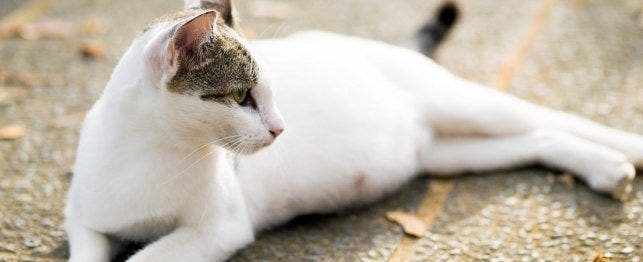
Pregnancy in Cats
Pregnancy is the period of gestation when the young are developing in the mother’s uterus. Normal gestation in cats is 58 to 68 days (the average is 63 days).
The litter size in cats varies from one kitten to more than 10. Litter sizes are often smaller in young and old animals and largest when the mother is around three to four years of age.
Conditions that may be confused with pregnancy include mastitis (inflammation of the mammary glands), mammary gland neoplasia (cancer), abdominal enlargement due to fluid accumulation or organ enlargement, or pyometra (infection of the uterus).
What to Watch For
- Nesting behavior (attempting to make a nest by tearing up papers, blankets, etc.)
- Mothering activity (this may include mothering of shoes, toys and other articles)
- Weight gain (which typically occurs after the 4th week of pregnancy)
- Abdominal enlargement or swelling
- Mammary gland enlargement. The mammary glands may be large and secrete milk or serous fluid (usually one to two days before delivery)
- Abnormal behavior. If your pet does not eat, acts lethargic or you notice excessive vaginal discharge, please call your veterinarian as soon as possible. Be aware that many cats seek seclusion before delivery, and this is considered normal delivery behavior.
Diagnosis
Your veterinarian may perform some diagnostic tests to confirm your cat’s health and to determine if she is pregnant. These include:
- A complete medical history and physical examination.
- Evaluating your cat’s behavior and noting any potential breeding episodes
- Abdominal palpation (technique of examining the organs and other parts of the body by touching and feeling). However, kittens can seldom be felt until at least 26 to 35 days after breeding and fetuses can be difficult to feel in some cats.
- Abdominal radiographs or X-rays (the skeleton of the kitten is visible on an X-ray after 45 days of pregnancy)
- Abdominal ultrasound can be used to diagnosis pregnancy after 21 to 24 days post breeding. This is a safe and excellent way to diagnose pregnancy and verify the health of the kittens. Ultrasound can also be used to estimate litter size.
- Testing for feline leukemia virus (FeLV) and feline immunodeficiency virus (FIV)
Your veterinarian may recommend other tests (not typically done with a normal pregnancy) based on a case-by-case basis. Tests may include:
- Complete blood count (CBC). There are no practical blood or urine tests available to diagnose pregnancy in cats.
- Serum biochemistry (bloodwork to look for abnormalities in liver and kidney function)
- Urinalysis
Treatment
- Normal pregnancy does not usually need any “treatment;” however, it is important to see your veterinarian for regular check-ups to ensure the health of your pet.
- It is extremely important that your cat be cared for properly during the pregnancy.
- If you decide that you do not wish to have further litters, or if your pet has significant problems during the birth process, you may wish to have her spayed to prevent further pregnancies.
- Have your veterinarian recheck your cat one week before the due date. The doctor may then palpate for kittens and perform a pelvic exam to establish a rough estimate of pelvic canal size vs. kitten size to try to anticipate problems that might occur during the delivery.
Home Care
Good nutrition is essential for healthy kittens and mothers so feed your pet a high-quality diet formulated for pregnant or nursing cats.
- Although nutritional needs change little during the first 4 weeks of gestation, your cat’s nutritional needs may double or triple during the last 5 weeks. Your veterinarian may recommend a special diet and/or vitamins for your cat.
- Be sure to provide the increased amounts of food she needs in several small meals each day, rather than feeding it all at one time. It is particularly important to feed frequent small meals during the last part of gestation. A pregnant cat may not feel like eating much as delivery nears because her abdomen is full of kittens, which leaves little room for the stomach to enlarge. Continue feeding a high-quality diet until after the kittens have been weaned.
- Be sure that fresh water is always available, since pregnancy increases your pet’s fluid needs.
- Moderate exercise is recommended. Neither forced rest nor strenuous exercise is a good idea. Keeping your cat indoors is often recommended (especially during the last couple weeks of pregnancy).
- If you would like to know more precisely when delivery is near, check the rectal temperature of the mother twice daily from the 58th day of pregnancy until labor begins. Normal rectal temperature varies between 100.5 and 102.0 degrees Fahrenheit. Within approximately 24 hours of the onset of labor the rectal temperature drops nearly two degrees in most cats.
Queening
The more that you can learn about queening (birth of the kittens), the better prepared you will be for any difficulties that might occur. Once you know that your cat is pregnant, you should begin preparing for the birth.
Provide a queening box for the mother to begin sleeping in to ensure that she gives birth to the kittens in an area that you have chosen (but this does not always happen). Allow her access to the box so she can become accustomed to it before delivery. The box can be covered and placed in a quiet (secluded) area where she will feel comfortable and protected. Newspapers or a soft blanket or towel can also be used.